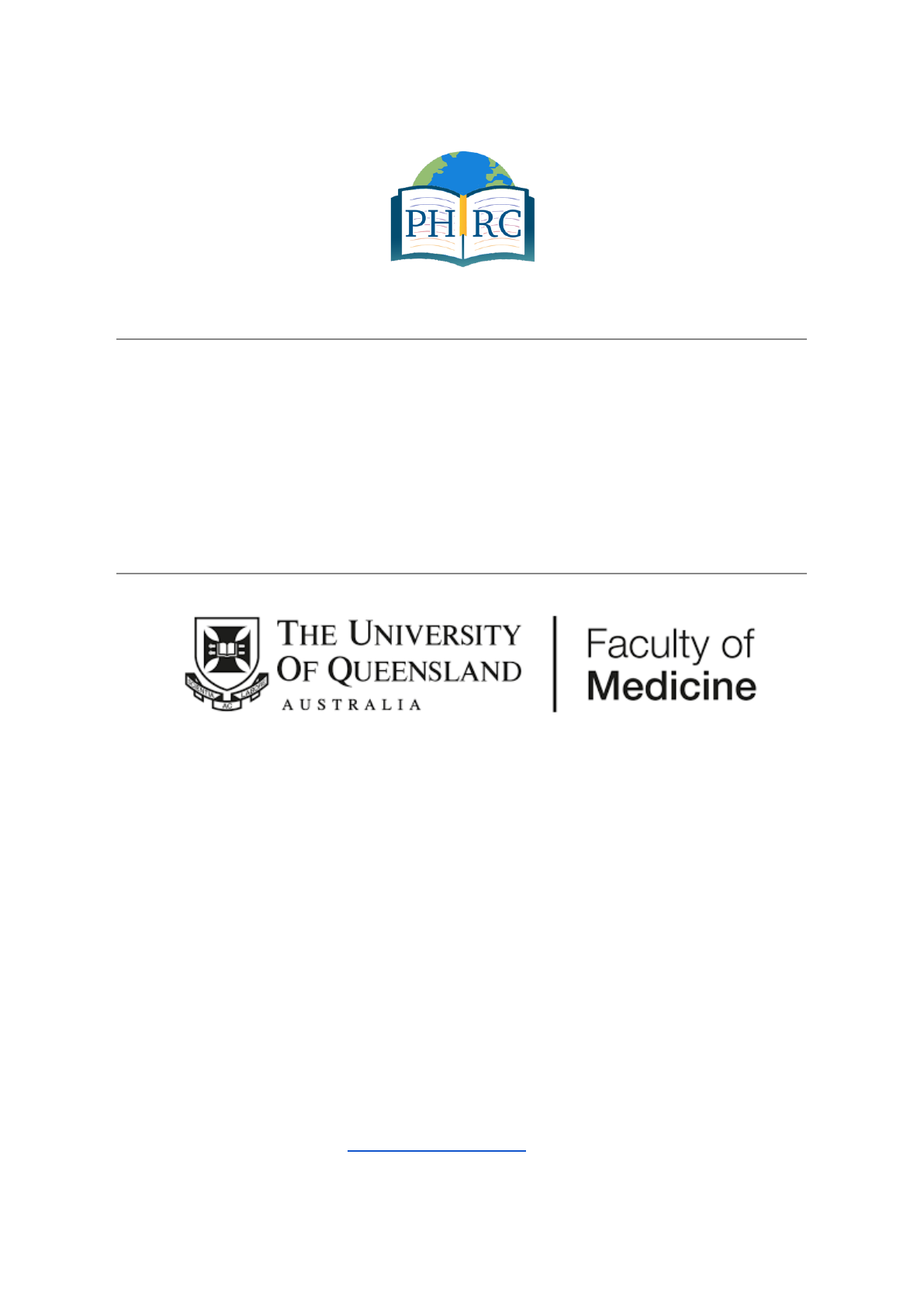
Summary of Findings
Overall
B
Curriculum
B
● The University of Queensland (UQ) Medical School includes some excellent planetary health content in the
curriculum which are explored in depth. The 2023 curriculum lacked longitudinal integration, however, it is
acknowledged that the Medical School is in the process of creating and refining a new program.
● Recommendations: The Medical School could employ a designated member of faculty to provide
clinicians with expert guidance to integrate planetary health concepts into lectures. Furthermore, teaching
regarding conversations about planetary health with patients could be introduced in clinical practice, or GP.
Interdisciplinary Research
B-
● UQ as an institution is engaging positively with planetary health interdisciplinary research, particularly the
School of Public Health, however UQ Medical School itself is lacking in this regard.
● Recommendations: Proactive research collaboration with other faculties, and joining an international
organisation dedicated to planetary health, could improve engagement with environmental health research.
Community Outreach and Advocacy
C+
● UQ has successfully created a range of initiatives designated to planetary health. The Medical School has
formed foundational relationships with the rural and First Nations communities. There are also frequent
communications within the Medical School and the broader community through seminars and newsletters.
● Recommendations: Delegating one article in each newsletter to a medically themed environmental piece
including discussion of new prescribing options, or ways to minimise wastage in practice. Additionally, UQ
Medical School should consider developing projects in partnership with communities more vulnerable to
planetary health decline, such as including rural and First Nations communities.
Support for Student-Led Initiatives
B
● UQ provides support for student-led initiatives related to sustainability, including a medical student club.
However, medical students typically have to seek out opportunities to engage with sustainability.
● Recommendation: Student engagement could be improved by: a medical student specific page on the
Sustainability webpage; sustainability focused research projects in the Foundations of Medical Research
course; volunteering in a sustainability initiative as assessment for the Introduction to Environmental Health
for Medicine elective; a sustainability focused student liaison position on the Medical Program
Student-Staff Liaison Group; and affiliations with Medical Students for a Sustainable Future.
Campus Sustainability
B
● UQ has a comprehensive sustainability strategy with goals for renewable energy, building standards, and
performance metrics. They promote environmentally responsible practices and provide infrastructure for
recycling, laboratories, and sustainable transportation.
● Recommendations: The university should consider hiring medical-specific personnel for the office of
sustainability and develop clear regulations for sustainable practices in food and beverage services and
catered events.

Statement of Purpose
Planetary health is human health.
The Planetary Health Alliance describes planetary health as “a solutions-oriented, transdisciplinary
field and social movement focused on analysing and addressing the impacts of human disruptions to
Earth’s natural systems on human health and all life on Earth.” This definition is intentionally broad,
intended to encompass the multitude of ways that the environment can affect health, including water
scarcity, changing food systems, urbanisation, biodiversity shifts, natural disasters, climate change,
changing land use and land cover, global pollution, and changing biogeochemical flows. The health of
humanity is dependent on our environment, and our environment is changing rapidly and in disastrous
ways. Although the World Health Organization has called climate change “the greatest threat to global
health in the 21st century,” many medical school’s institutional priorities do not reflect the urgency of
this danger to human health.
As future health professionals, we must be prepared to address the impacts of human-caused
environmental changes on our patients’ health. This preparation is in the hands of the institutions
providing our medical training. It is imperative that we hold our institutions accountable for educating
medical students about the health impacts of climate change and other anthropogenic environmental
changes, generating research to better understand health impacts and solutions, supporting related
student initiatives, embracing sustainable practices as much as possible, and engaging with
surrounding communities that are most affected by environmental threats. Because climate change
and environmental threats disproportionately affect vulnerable populations (for example, communities
of colour, older adults sensitive to health threats, and individuals in low-resource settings), these
issues are inherently ones of equity and justice.
With the purpose of increasing planetary health awareness and accountability among medical schools,
we have created a Planetary Health Report Card that medical students internationally can use to grade
and compare their home institutions on an annual basis. This medical-student-driven initiative aims to
compare medical schools nationally and internationally on the basis of discrete metrics in five main
category areas: 1) planetary health curriculum, 2) interdisciplinary research in health and
environment, 3) university support for student planetary health initiatives, and 4) community outreach
centred on environmental health impacts 5) medical school campus sustainability.

Definitions & Other Considerations
Definitions:
● Planetary Health: is described by the Planetary Health Alliance as “the health of human
civilisation and the state of the natural systems on which it depends.” For example, topics
such as climate change, declining biodiversity, shortages of arable land and freshwater, and
pollution would all fall under the realm of planetary health. Both planetary health and
traditional ‘environmental health’ examine the relationship between human health and the
external environment, including extreme temperatures, chemicals, vector-borne diseases, etc.
Planetary health explicitly concerns itself with the potential health harms associated with
human-caused perturbations of natural systems. Therefore, the human health focus of
planetary health makes the field well-adapted for the context of medical school education.
Throughout this report card, we use the term planetary health to refer to this broad swath of
topics, but resources do not need to explicitly include the term “planetary health” to satisfy
the metric.
● Sustainable Healthcare: As defined by the Academy of Royal Colleges, sustainable
healthcare involves ensuring the ability to provide good quality care for future generations by
balancing the economic, environmental, and social constraints and demands within health
care settings. A sustainable healthcare system maintains population health, reduces disease
burden and minimises use of healthcare services.
● Education for Sustainable Healthcare (ESH): is defined as the process of equipping current
and future health professionals with the knowledge, attitudes, skills and capacity to provide
environmentally sustainable services through health professional education, thus working to
decrease the enormous environmental impact of the healthcare industry. Planetary Health
Education is an integral part of this education rather than an end in itself. This is because
knowledge on Planetary Health is required to be able to fully understand the necessity of
sustainable healthcare as well as being part of the broader knowledge needed to fully protect
and promote health. In summary, ESH is covered by the three Priority Learning Outcomes of
the Centre of Sustainable Healthcare below, and Planetary Health Education is embraced in
the first learning objective and is a fundamental requirement to achieve learning outcomes 2
and 3:
1. Describe how the environment and human health interact at different levels.
2. Demonstrate the knowledge and skills needed to improve the environmental
sustainability of health systems.
3. Discuss how the duty of a doctor to protect and promote health is shaped by the
dependence of human health on the local and global environment.
● Medical School vs. Institution: When “medical school” is specified in the report card, this
only refers to curriculum and resources offered by the School of Medicine and does not
include offerings from other parts of the university (e.g. undergraduate departments (USA),
other related departments (e.g. Public Health, Population Health departments). In contrast,
when “institution” is specified in the report card, we are referring to the university more

broadly. Any resource reasonably accessible by medical students, no matter where in the
institution the resource comes from or if it is specifically targeted for medical students, can
meet this metric.
● Environmental history (Metric #19 in Curriculum Section): This is a series of questions
providers are taught to ask during medical encounters that elicits patients’ exposures and
environmental risk factors. Historically, this has included consideration of exposures like
pesticides, asbestos, and lead, though in the modern era shaped by climate change, it can be
expanded to include things like wildfire smoke exposure, air pollution and mould after
flooding. Key components include place of residence over the lifecourse, occupational
history, food and water sources (e.g. meat from industrial feeding operations, regular fishing
in contaminated water, access to clean drinking water), and exposure to air pollution.
● Elective: The word “elective” refers to an optional course or lecture series that a medical
student can opt to take part in but is not a requirement in the core curriculum. Generally, these
elective courses take place in the preclinical curriculum but vary by school.
● Clerkship: This is a term used in the USA to refer to placements that medical students go on
e.g. Pediatrics, General medicine, Psychiatry. In the UK these are referred to as rotations or
placements.
Other considerations:
● If there are more than one “tracks” at your medical school with two different curricula (for
example, Harvard Medical School has a Pathways and HST curriculum track), you can
choose to fill out a report card for each track, or fill out just one report card and average the
scores received by each track in cases where the scores are different (see the 2021 Harvard or
Oxford report cards as examples).
Added to our resources in 2022, the Planetary Health Report Card Literature Review
by Metric collates the evidence behind each of the metrics in the Planetary Health
Report Card. It serves as a collection of references for further learning and a resource
for those advocating for increased planetary health engagement at their institutions.

Planetary Health Curriculum
Section Overview: This section evaluates the integration of relevant planetary health topics into the
medical school curriculum. Today's medical students will be on the frontlines of tackling the health
effects of climate and other environmental changes. Therefore, it is critical that medical students are
trained to understand the health effects of these changes, as well as planetary health issues and
principles more broadly. Topics like the changing geography of vector-borne diseases, the health
consequences of air pollution, environmental health inequities, and disaster response principles must
be part of every medical school's core curriculum.
Curriculum: General
1.1. Did your medical school offer elective courses (student selected modules) to engage students
in Education for Sustainable Healthcare or Planetary Health in the last year?
3
Yes, the medical school has offered more than one elective whose primary focus is
ESH/planetary health in the past year.
2
Yes, the medical school has offered one elective whose primary focus is ESH/planetary health in
the past year.
1
The medical school does not have any electives whose primary focus is ESH/planetary health,
but there are one or more electives that include a lecture on planetary health.
0
No, the medical school has not offered any electives on planetary health or electives that include
ESH/planetary health topics in the past year.
For first year students, no electives offered, only single course Foundations of Medicine MEDI7100.
In second year, at University of Queensland, Introduction to Environmental Health for Medicine
(PUBH7287) is a semester-long elective offered to second year medical students which delivers
teaching via lectures and tutorials. Other electives also offered that briefly include planetary health in
their teachings are Health Promotion in Public Health for Medicine (PUBH7288) and Global Health
Policy in Practice for Medicine (PUBH7291).
Curriculum: Health Effects of Climate Change
1.2. Does your medical school curriculum address the relationship between extreme heat, health
risks, and climate change?
3
This topic was explored in depth by the core curriculum.
2
This topic was briefly covered in the core curriculum.
1
This topic was covered in elective coursework.
0
This topic was not covered.

For first year students, MEDI7100: Advocacy & Public Health Workshops provided a connection
between climate change ideas as well as their relevance in health practice. The pre-learning for the
week 17 Introduction to Climate Change workshop addressed UN Secretary General Antonio
Gueterras launching the 'United in Science' report September 2022 and the video discussed
catastrophic consequences of global warming to 1.5 degrees celsius. The workshop lecture slides
spoke on changes in global surface temperatures and ocean heat uptake.
In Week 19, The Impact of Climate Change Workshop, the lecture and slides discussed climate sensitive
health risks (heat impacts on health) including anger and violence. There was also discussion of health
and environmental impacts of extreme temperatures due to global warming. The small group activity
and large group discussion within the workshop discussed the extreme heat impact on health, SES and
climate, health inequity, health infrastructure, moderators, and opportunities for adaptation.
For second year students, in the course Integrated Clinical Studies (MEDI7212), the week focusing on
environmental threats had a dedicated lecture, ‘Impacts of Heat,’ and symposium ‘Impact of
environmental factors on patient care,’ as well as required readings, focusing on this topic. The
case-based learning also explored this topic with the Week 1 Main Case ‘Extreme heat in the far
North,’ specifically focusing on the impacts of heat waves, and their rising incidence, as well as the
health consequences and how to manage them on a public health level.
1.3. Does your medical school curriculum address the impacts of extreme weather events on
individual health and/or on healthcare systems?
3
This topic was explored in depth by the core curriculum.
2
This topic was briefly covered in the core curriculum.
1
This topic was covered in elective coursework.
0
This topic was not covered.
For first year students, MEDI7100 Advocacy & Public Health Workshops covered the topic
‘Introduction to Climate Change’ in week 17 and the Impact of Climate Change in week 19. Slides and
lectures taught future projections of extreme weather events (heatwaves, river floods, rainfall, sand,
and dust storms). Required reading discussed climate change causing frequent and severe heat waves,
leading to death and illness. Workshop slides included teaching on ‘Health and SES impacts of climate
change’ with discussion of extreme temperatures due to global warming's effect on health and the
environment. Small group activity and large group discussion within the workshop discussed extreme
weather events’ impact on health, SES and climate, health inequity, health infrastructure, moderators,
and opportunities for adaptation.
For second year students, in the course Integrated Clinical Studies (MEDI7212), the ‘Environmental
Threats’ week had a series of lectures which explored how various extreme weather events, such as
bushfires, flooding, and heat waves, impact healthcare systems and cause disease. These were further
reinforced in the case-based learnings, namely the Week 1, Main Case ‘Extreme heat in the far North’
and Week 1, Short Case 2 ‘The Mudder of all Endurance Events’.
1.4. Does your medical school curriculum address the impact of climate change on the changing
patterns of infectious diseases?
3
This topic was explored in depth by the core curriculum.

2
This topic was briefly covered in the core curriculum.
1
This topic was covered in elective coursework.
0
This topic was not covered.
For first year students, the MEDI7100 Week 16 Advocacy and Public Health Workshop topic was
environmental impacts on health, including a lecture, discussion, casework, and pre reading from the
Australian Institute of Health and Welfare (AIHW). Some of the slides discussed the natural
environment and health, identifying and discussing a range of environmental determinants of health
including infectious disease. The slides linked to some reading on vectors, communicable diseases, and
Queensland-specific diseases like leptospirosis (but this was not discussed in the workshop).
Following were slides addressing the impact of environmental factors and health, but not specific to
infectious diseases, with a much greater focus on links with chronic disease like air pollution and
CVD, respiratory infections linked to asthma or UV exposure, obesity or environmental toxins.
For second year students, in the course Integrated Clinical Studies (MEDI7212), the week focusing on
environmental threats involved a symposium titled ‘Impact of environmental factors on patient care’,
with a slide exploring the threat of infectious diseases in regards to climate change. The week focusing
on local and global infections had a lecture titled ‘Tropical infection and the febrile child,’ which had a
couple of slides acknowledging how climate change poses a risk for increased atypical and increased
case numbers of infectious diseases.
1.5. Does your medical school curriculum address the respiratory health effects of climate change
and air pollution?
3
This topic was explored in depth by the core curriculum.
2
This topic was briefly covered in the core curriculum.
1
This topic was covered in elective coursework.
0
This topic was not covered.
For first year students, as part of the MEDI7100 Week 16 workshops focused on the intersection
between chronic disease and the environment. Learning activities included a case study, large and
small group discussion, a lecture and reflection sessions on how this will inform future practice. Topics
specifically addressed included air pollution (road, industrial) and mould exposure, and the resultant
respiratory diseases, infections and asthmatic episodes. A few PowerPoint slides were dedicated to
studies on air pollution and respiratory disease (especially asthma).
For second year students, in the course Integrated Clinical Studies (MEDI7212), the week focusing on
environmental threats had a symposium, ‘Impact of environmental factors on patient care,’ with a
lecture exploring the impact of carbon pollution on lung health.
1.6. Does your medical school curriculum address the cardiovascular health effects of climate
change, including increased heat?
3
This topic was explored in depth by the core curriculum.
2
This topic was briefly covered in the core curriculum.

1
This topic was covered in elective coursework.
0
This topic was not covered.
For first year students, the MEDI7100 Week 16 Workshop had multiple learning modalities teaching
students about the environment’s impact on chronic disease, with a great focus on cardiovascular
disease (CVD). This included a case study, small and large group discussion, a lecture and videos.
Pre-reading and discussion was on ‘Environmental determinants of cardiovascular disease: lessons
learned from air pollution,’ (a case study of a patient with CVD and activities to determine what
environmental risks were present and how to go about management). The PowerPoint presented during
this workshop was dedicated mostly to data surrounding factors that affect chronic disease. Most slides
focused on CVD environmental determinants, including a slide ‘Exposure to environmental risk factors
(external exposome) leads to changes of central biochemical pathways with associated health impact,’
and 5 slides on biological pathways linking air and noise pollution to the pathophysiology of CVD.
They also spent considerable teaching on the links of different social determinants of health together on
CVD and mitigation strategies.
For second year students, in the course Integrated Clinical Studies (MEDI7212), the week focusing on
environmental threats involved several lectures and readings which explored physiological response to
heat, focusing on the cardiovascular system. The most prominent lecture was ‘Impacts of Heat’ and the
symposium ‘Impact of environmental factors on patient care.’ This was further reinforced in the
case-based learnings, namely the Week 1, Main Case ‘Extreme heat in the far North.’
1.7. Does your medical school curriculum address the mental health and neuropsychological
effects of environmental degradation and climate change?
3
This topic was explored in depth by the core curriculum.
2
This topic was briefly covered in the core curriculum.
1
This topic was covered in elective coursework.
0
This topic was not covered.
For first year students, as part of MEDI7100 in the ‘Environment determinants of health’ workshop in
Week 16, the implications of environmental factors on mental health of patients in a case study are
touched upon without in-depth analysis. In the week 19 climate change workshop, the lecture lists
climate-sensitive risks including mental and psychosocial health and that it impacts health systems and
facilities, but not in what specific ways.
For second year students, in the course Integrated Clinical Studies (MEDI7212), the week focusing on
environmental threats had lectures, ‘Impacts of Heat’, ‘Health System adaptation to climate change’
and ‘Impact of environmental factors on patient care symposium’, which each had a couple slides
exploring how those with mental health conditions are at risk of deterioration, how those without
diagnosed mental health conditions can have diminished cognitive function from heat, and how events
like bushfires devastate communities with a need for mental health support.
1.8. Does your medical school curriculum address the relationships between health, individual
patient food and water security, ecosystem health, and climate change?
3
This topic was explored in depth by the core curriculum.

2
This topic was briefly covered in the core curriculum.
1
This topic was covered in elective coursework.
0
This topic was not covered.
For first year students, in both Weeks 17 and 19 of the MEDI7100 course there is considerable time
given to climate change in advocacy and public health workshops labelled ‘Climate Change.’ In the
workshop lecture in Week 19, the theme was ‘Health and SES Impacts of climate change’ of which the
learning objectives included: Describe the health and socioeconomic impacts of climate change;
describe the moderators of these impacts; discuss the impacts of climate change on health inequities;
and discuss the role of adaptation in responding to the impacts. Specifically in the Week 19 workshop,
two discussion questions were posed: one of extreme weather events leading to scarcity of basic needs
(food, water, etc.) and the other of biodiversity loss.
For second year students, in the course Integrated Clinical Studies (MEDI7212), the week focusing on
environmental threats had several lectures on this topic. ‘Impacts of Heat’ and ‘Health System
adaptation to climate change’ explored the effect of power outages and other climate events on food
and water security, with changes to infrastructure, such as coolants, offered as a solution to reduce
vulnerability. Similarly, ‘Climate Change and Food and Nutrition’ thoroughly addressed the
relationship between climate change and food insecurity. Additionally, the symposium ‘Impact of
environmental factors on patient care’ highlighted how droughts, floods, and disease can impact water
and food access.
1.9. Does your medical school curriculum address the outsized impact of climate change on
marginalised populations such as those with low SES, women, communities of colour, Indigenous
communities, children, homeless populations, and older adults?
3
This topic was explored in depth by the core curriculum.
2
This topic was briefly covered in the core curriculum.
1
This topic was covered in elective coursework.
0
This topic was not covered.
For first year students in MEDI7100 Weeks 16 & 19 workshops ‘Climate Change’, there is an overview
of environmental determinants and climate change in the context of health. Environmental
determinants discussed in the workshop included economic stability, education, community, race,
sociopolitical conditions, demographics and health status. In the workshop lecture in week 19 the
theme was ‘Health and SES Impacts of climate change’, of which the learning objectives included
discussion on the impacts of climate change on health inequities and discussion of the role of
adaptation in responding to the impacts. There were in depth slides on relationships and interplay of
different social determinants of health with climate change in society.
For second year students, in the course Integrated Clinical Studies (MEDI7212), the week focusing on
environmental threats had readings, lectures (‘Impacts of Heat’ and ‘Impact of environmental factors
on patient care - symposium’) and case-based learning (Week 1, Main Case ‘Extreme heat in the far
North) covering how vulnerable populations are disproportionately affected, and at risk of being
affected, by climate change.

1.10. Does your medical school curriculum address the unequal regional health impacts of
climate change globally?
3
This topic was explored in depth by the core curriculum.
2
This topic was briefly covered in the core curriculum.
1
This topic was covered in elective coursework.
0
This topic was not covered.
For first year students in MEDI7100 Week 19 ‘Health and Socioeconomic Impacts of Climate Change’
workshops lecture, there was a slide on the global and regional risks for increasing levels of global
warming. There are also two other slides on increasing global warming causing ecological and
agricultural droughts in dry regions and heavy precipitation in others, as well as extremes in
temperatures regionally.
For second year students, in the course Integrated Clinical Studies (MEDI7212), the week focusing on
environmental threats has a lecture titled ‘Health System adaptation to climate change’ with a slide on
the unequal climate adaptation gap, where disadvantaged populations are more likely to suffer the
health impacts of climate change both globally, and nationally.
Curriculum: Environmental Health & the Effects of Anthropogenic Toxins on Human Health
1.11. Does your medical school curriculum address the reproductive health effects of
industry-related environmental toxins (e.g. air pollution, pesticides)?
3
This topic was explored in depth by the core curriculum.
2
This topic was briefly covered in the core curriculum.
1
This topic was covered in elective coursework.
0
This topic was not covered.
For students in year 1, nothing was taught about reproductive health in relation to environmental
toxins.
Similarly, this topic was not covered in any year 2 electives or in core curriculum. In the Reproductive
week of Clinical Sciences 3 (MEDI7211), a lecture titled ‘Approach to the Infertile Couple’ had a dot
point on a slide mentioning that exposure to chemicals and toxins such as mercury, cadmium, volatile
organic solvents, pesticides and textile dyes has been implicated in causing female infertility, but this
was not a focus.
1.12. Does your medical school curriculum address important human-caused environmental
threats that are relevant to the university’s surrounding community?
3
This topic was explored in depth by the core curriculum.
2
This topic was briefly covered in the core curriculum.

1
This topic was covered in elective coursework.
0
This topic was not covered.
For first year students, the week 17 advocacy workshop discussed climate change mitigation options at
individual, community and policy levels. Discussion about flooding and deforestation was initiated by a
slide on Australia being one of the highest per-capita CO2 emitters in the world and the effects that
would have on the Australian environment and society.
For second year students, in the course Integrated Clinical Studies (MEDI7212), the week focusing on
environmental threats had case-based learning tutorials with 3 cases focused on health issues in
Queensland directly resulting from human-caused climate change. The topics covered included extreme
heat waves and bushfire risks in North Queensland (with a focus on Townsville and Cairns), migration
of the Irukandji jellyfish near K’gari and Hervey Bay, and melioidosis risk after flooding and
monsoonal rain in Townsville. Additionally, the elective Introduction to Environmental Health for
Medicine (PUBH7287) considers local environmental health with some local examples (e.g. green
space in Brisbane City Council areas).
1.13. To what extent does your medical school emphasise the importance of Indigenous
knowledge and value systems as essential components of planetary health solutions?
3
Indigenous knowledge and value systems are integrated throughout the medical school’s
planetary health education
2
Indigenous knowledge and value systems as essential components of planetary health solutions
are included briefly in the core curriculum.
1
Indigenous knowledge and value systems as essential components of planetary health solutions
are included in elective coursework.
0
This topic was not covered.
While various lectures were delivered in the core curriculum in Year 1 and 2 regarding Indigenous
Australians and cultural safety, with recognition of how Aboriginal and Torres Strait Islander peoples
worked with the land to survive and thrive, these were not delivered in the context of planetary health.
In the second-year elective Introduction to Environmental Health for Medicine (PUBH7287), the
course coordinator draws from their research work which has a large focus on Indigenous Voices and
Knowledges leading climate discussions and decision-making. The course also has a guest lecturer
who is an Aboriginal Environmental Health Worker based in remote NT communities.
1.14. Does your medical school curriculum address the outsized impact of anthropogenic
environmental toxins on marginalised populations such as those with low SES, women,
communities of colour, children, homeless populations, Indigenous populations, and older adults?
3
This topic was explored in depth by the core curriculum.
2
This topic was briefly covered in the core curriculum.
1
This topic was covered in elective coursework.

0
This topic was not covered.
University of Queensland did not cover the impact of anthropogenic environmental toxins in the core
medical school curriculum. In the second year elective, Introduction to Environmental Health for
Medicine (PUBH7287), social determinants of health in both the causes and protective factors from
climate change and other environmental health impacts were discussed, including anthropogenic
environmental toxins.
Curriculum: Sustainability
1.15. Does your medical school curriculum address the environmental and health co-benefits of a
plant-based diet?
3
This topic was explored in depth by the core curriculum.
2
This topic was briefly covered in the core curriculum.
1
This topic was covered in elective coursework.
0
This topic was not covered.
In year one, MEDI7100, there was minimal coverage of plant-based diets outside the context of looking
out for B12 deficiency in vegans in a team-based learning class on nutrition and diet.
For second year students, in the course Integrated Clinical Studies (MEDI7212), the week focusing on
environmental threats had a lecture titled ‘Climate Change and Food and Nutrition’. This lecture
touched on how choosing more healthy plant-based options was recommended as one of four key
principles to achieving a sustainable diet, and that the data supporting this was rejected from the
national dietary guidelines resulting in recommended diets that revolve around omnivorous models, not
vegetarian options. Further exploration of the health and environmental benefits of a plant-based diet
was minimal.
1.16. Does your medical school curriculum address the carbon footprint of healthcare systems?
3
This topic was explored in depth by the core curriculum
2
This topic was briefly covered in the core curriculum.
1
This topic was covered in elective coursework.
0
This topic was not covered.
For second year students, in the course Integrated Clinical Studies (MEDI7212), the week focusing on
environmental threats had a dedicated lecture titled ‘Health System Climate Mitigation’ addressing the
carbon footprint of the healthcare system.
1.17. Does your medical school curriculum cover these components of sustainable clinical
practice in the core curriculum? (points for each)

2
The health and environmental co-benefits of avoiding over-medicalisation, over-investigation
and/or over-treatment
2
The environmental impact of pharmaceuticals and over-prescribing as a cause of climate health
harm. Alternatively teaching on deprescribing where possible and its environmental and health
co-benefits would fulfil this metric.
1
The health and environmental co-benefits of non-pharmaceutical management of conditions
where appropriate such as exercise or yoga classes for type 2 diabetes; social group activities
such as gardening for mental health conditions; active transport such as bicycle schemes. This is
commonly known as social prescribing in the UK.
1
Environmental impact of surgical healthcare on planetary health and the climate crisis, and how
can it be mitigated
1
The impact of anaesthetic gases on the healthcare carbon footprint and ways to reduce
anaestheisa’s environmental impacts, such as total intravenous anaesthesia or choosing less
environmentally harmful anaesthetic gas options with reduced greenhouse gas emissions
1
The impact of inhalers on the healthcare carbon footprint and the environmental benefit of dry
powdered inhalers over metered dose inhalers.
1
Waste production within healthcare clinics and strategies for reducing waste in clinical activities
(e.g. single use items in the inpatient or outpatient setting)
1. For second year students, in the course Integrated Clinical Studies (MEDI7212), the week
focusing on environmental threats had a lecture titled ‘Health System Climate Mitigation,’
which highlighted research demonstrating pre-operative over-investigation across several
specialties and how a ‘Choose Wisely’ approach would have positive environmental and
economical impacts.
2. Not covered.
3. Not covered.
4. Not covered.
5. For second year students, in the course Integrated Clinical Studies (MEDI7212), the week
focusing on environmental threats had a lecture titled ‘Health System Climate Mitigation’
which explored how research and education of anaesthetists has results in sevoflurane, a gas
with 7 times less carbon emissions compared to desflurane, being used as the default in
hospitals.
6. For second year students, in the course Integrated Clinical Studies (MEDI7212), the week
focusing on environmental threats had a lecture titled ‘Health System Climate Mitigation’
which specified the impact of metered dose inhalers and how dry powder inhalers are a more
sustainable solution. This concept had also been previously discussed in asthma
pharmacological management lectures.
7. For second year students, in the course Integrated Clinical Studies (MEDI7212), the week
focusing on environmental threats had a lecture titled ‘Health System Climate Mitigation’
which provided examples of clinician-led action including audit findings which resulted in
switching to reusables from single-use items, programs to collect usable medical items that
would have been disposed of and redistribute them to charitable organisations, and soft
plastics collection resulting in a closed loop recycling program.
Curriculum: Clinical Applications

1.18. In training for patient encounters, does your medical school’s curriculum introduce
strategies to have conversations with patients about the health effects of climate change?
2
Yes, there are strategies introduced for having conversations with patients about climate change
in the core curriculum.
1
Yes, there are strategies introduced for having conversations with patients about climate change
in elective coursework.
0
No, there are not strategies introduced for having conversations with patients about climate
change
At the University of Queensland, there was no evidence supporting that the medical school included
this in the curriculum.
1.19. In training for patient encounters, does your medical school’s curriculum introduce
strategies for taking an environmental history or exposure history?
2
Yes, the core curriculum includes strategies for taking an environmental history.
1
Only elective coursework includes strategies for taking an environmental history.
0
No, the curriculum does not include strategies for taking an environmental history.
At the University of Queensland, medical students are taught to take a thorough patient history which
includes asking about environmental exposure (e.g. through travel, home environment, etc) and
occupational exposure with reinforcements of the physiological effects of environmental exposures in
clinical science content.
Curriculum: Administrative Support for Planetary Health
1.20. Is your medical school currently in the process of implementing or improving Education for
Sustainable Healthcare (ESH)/planetary health education?
4
Yes, the medical school is currently in the process of making major improvements to
ESH/planetary health education.
2
Yes, the medical school is currently in the process of making minor improvements to
ESH/planetary health education.
0
No, there are no improvements to planetary health education in progress.
UQ medical school is restructuring its program to become a more integrative course with fewer stand
alone sessions focused on planetary health. While the content will remain fairly similar to previous
years, there will be a shift from teaching about the science of climate change, to an increase in the
more clinical aspects of climate change, based on student and staff feedback. After speaking with the
representative from the UQ School of Public Health, who develops medical school planetary health
teachings, it was agreed that regarding the teachings they coordinate, there will be minor
improvements. However, due to the integrative nature of this newer program, the extent to which

planetary health will be incorporated in other domains that are not organised by the School of Public
Health, is unknown.
1.21. How well are the aforementioned planetary health/Education for Sustainable Healthcare
topics integrated longitudinally into the core curriculum?
6
Planetary health/ESH topics are well integrated into the core medical school curriculum.
4
Some planetary health/ESH topics are appropriately integrated into the core medical student
curriculum.
2
Planetary health/ESH is not integrated and is primarily addressed in (a) standalone lecture(s).
0
There is minimal/no education for sustainable healthcare.
UQ medical school is restructuring its program to become a more integrative course with fewer stand
alone sessions focused on planetary health. A representative from the UQ School of Public Health who
develops medical school planetary health teachings shared the developments for fewer stand alone
planetary health sessions, to an increased amount of planetary health content within each clinical
topic/organ system module. It is important to note however that due to the integrative nature of this
newer program, the extent to which planetary health will be incorporated in other domains, not
organised by the School of Public Health, is unknown.
Despite these upcoming improvements, in 2023, this metric would receive a score of 2 as there is a
stand alone ‘Environmental Health’ week in the year 2 Integrated Clinical Studies (MEDI7212)
course, which is not integrated with other teachings.
1.22. Does your medical school employ a member of faculty to specifically oversee and take
responsibility for the incorporation of planetary health and sustainable healthcare as a theme
throughout the course?
1
Yes, the medical school has a specific faculty/staff member responsible for overseeing curricular
integration of planetary health and sustainable healthcare
0
No, the medical school does not have a specific faculty/staff member responsible for overseeing
curricular integration of planetary health and sustainable healthcare.
The curriculum coordinators in the School of Medicine are responsible for overseeing the integration
of planetary health teachings. Within the Medical School, the domain responsible for this part of
curriculum is advocacy and public health. Much of the planetary health content is developed and
coordinated by staff in the UQ School of Public Health, who work in collaboration with the Medical
School to ensure this theme is maintained throughout the course.
Section Total (51 out of 72)
70.83%
Back to Summary Page here

Interdisciplinary Research
Section Overview: This section evaluates the quality and quantity of interdisciplinary planetary
health research at the medical school and broader institution. Interactions between health and the
environment are complex and multifactorial. While climate change has been extensively studied from
an environmental science perspective, planetary health is an emerging field. As leading health
institutions with talented researchers and research resources, medical schools should fund research
studying the health effects of climate change and anthropogenic environmental toxins. This obligation
is particularly strong because the public and policymakers are more attentive to climate change when
its implications for human health are emphasised.
2.1. Are there researchers engaged in planetary health research and healthcare sustainability
research at your medical school?
3
Yes, there are faculty members at the medical school who have a primary research focus in
planetary health or healthcare sustainability.
2
Yes, there are individual faculty members at the medical school who are conducting research
related to planetary health or healthcare sustainability, but it is not their primary research focus.
1
There are planetary health and/or healthcare sustainability researchers at the institution, but none
associated with the medical school.
0
No, there are no planetary health and/or healthcare sustainability researchers at the institution or
medical school at this time.
UQ Medical School does not appear to have any research specifically focussed on planetary health or
healthcare sustainability. There are some groups focussing indirectly on the impact of the environment
on human health, such as the Thoracic Research Centre researching the impact of air pollution on
disease development, although specifics on their projects in this area were unable to be ascertained.
There are, however, other schools at the institution with the specific research focus of planetary health.
For example, the Faculty of Business, Economics and Law’s Sustainable Infrastructure Research Hub,
which enables ‘rapid research collaboration between industry, government academia and
communities’ in the areas of energy, water and transport. Additionally, the School of Public Health has
researchers focussing on both ‘Environmental epidemiology and sociology’ and ‘Climate change and
health’.
2.2. Is there a dedicated department or institute for interdisciplinary planetary health research at
your institution?
3
There is at least one dedicated department or institute for interdisciplinary planetary health
research.
2
There is not currently a department or institute for interdisciplinary planetary health research,
but there are plans to open one in the next 3 years.
1
There is an Occupational and Environmental Health department, but no interdisciplinary
department or institute for planetary health research.

0
There is no dedicated department or institute.
UQ (alongside the Queensland Government) jointly funds the ‘Queensland Alliance for Environmental
Health Sciences’, an institute that explores climate health challenges through interdisciplinary
research. Furthermore, as described above in section 2.2, there are several departments across
different schools at UQ whose primary research focus is environmental health or sustainability.
Furthermore, individual projects have centred around planetary health such as The Australian Institute
of Bioengineering and Nanotechnology has a specific research focus into energy solutions and The
School of the Environment names one of their research themes as ‘Biodiversity and Conservation
Science’. UQ is also participating in the ‘Alliance to achieve net zero emissions in agriculture’. UQ
advertise their research teams as ‘multidisciplinary’.
2.3. Is there a process by which communities disproportionately impacted by climate change and
environmental injustice give input or make decisions about the research agenda at your medical
school?
3
Yes, there is a process in which community members impacted by climate and environmental
injustice have decision-making power in the climate + environmental research agenda.
2
Yes, there is a process in which community members impacted by climate and environmental
injustice advise the climate + environmental research agenda.
1
No, but there are current efforts to establish a process for community members to advise or
make decisions on the research agenda.
0
There is no process, and no efforts to create such a process.
As described in Section 2.1, UQ Medical School does not engage in any specific climate change
focussed research. There does not appear to be a standardised process for consulting with community
stakeholders to direct the research agenda in the medical school. The institution of UQ described
consultation with ‘major stakeholders’ in their research strategy, however, does not specify who these
are or the process of gaining their input.
2.4. Does your institution have a planetary health website that centralises ongoing and past
research related to health and the environment?
3
There is an easy-to-use, adequately comprehensive website that centralises various campus
resources related to health and the environment including all of the following: upcoming events,
leaders in planetary health at your institution, and relevant funding opportunities.
2
There is a website that attempts to centralise various campus resources related to health and the
environment, but it is hard-to-use, not updated, or not adequately comprehensive.
1
The institution has an Office of Sustainability website that includes some resources related to
health and the environment.
0
There is no website.

UQ has a website dedicated to Sustainability which outlines UQ’s sustainability strategy, current
projects from different schools and disciplines, and how to get involved for current students and
alumni.
2.5. Has your institution recently hosted a conference or symposium on topics related to
planetary health?
4
Yes, the medical school has hosted at least one conference or symposium on topics related to
planetary health in the past year.
3
Yes, the institution has hosted at least one conference or symposium on topics related to
planetary health in the past year.
2
Yes, the institution has hosted a conference on topics related to planetary health in the past three
years.
1
The institution has not hosted any conferences directly, but they have provided financial support
for a local planetary health event.
0
No, the institution has not hosted a conference on topics related to planetary health in the past
three years.
UQ hosted the iDEA conference for 2023 where the theme was ‘Surviving and Thriving’ focussing on
‘the intersection of environmental advocacy across a range of spheres including healthcare, economics
and law’. UQ also hosted other events and conferences such as the ‘Circular Bioeconomy in a
Decarbonised World’ symposium (June 2023), the ‘Key Technologies in the Bioeconomy: A Global
Bioeconomy Alliance Conference’ which aimed to facilitate discussion on ‘building a sustainable
future amidst a backdrop of unprecedented change’ (September 2023) and the ‘2023 ACTS The Future
of Sustainability Conference’ (November 2023).
2.6. Is your medical school a member of a national or international planetary health or ESH
organisation?
1
Yes, the medical school is a member of a national or international planetary health or ESH
organisation
0
No, the medical school is not a member of such an organisation
Although UQ has an affiliation through the student body to Doctors for the Environment, I cannot find
evidence of membership to a national or international planetary health organisation.
Section Total (11 out of 17)
64.71%
Back to Summary Page here

Community Outreach and Advocacy
Section Overview: This section evaluates medical school engagement in community outreach and
advocacy efforts associated with planetary health. Researching and teaching planetary health is
necessary but not sufficient. It is critical that institutions also directly engage with communities most
affected by environmental health harms. Although climate change is a problem largely created by
those with power and resources, its impacts fall disproportionately on under-resourced populations
and communities of colour. Institutions should partner with local communities affected by climate
change and pollution to share information about environmental health threats, advocate together for
change, and provide opportunities for students to be a part of this work.
3.2. Does your medical school offer community-facing courses or events regarding planetary
health?
3
The medical school offers community-facing courses or events at least once every year.
3.1. Does your medical school partner with community organisations to promote planetary and
environmental health?
3
Yes, the medical school meaningfully partners with multiple community organisations to
promote planetary and environmental health.
2
Yes, the medical school meaningfully partners with one community organisation to promote
planetary and environmental health.
1
The institution partners with community organisations, but the medical school is not part of that
partnership.
0
No, there is no such meaningful community partnership.
University of Queensland Medical School staff and students have affiliations with the Doctors for the
Environment. In 2023, it hosted the annual Doctors for the Environment conference
(https://dea.org.au/idea23/). Furthermore, the Medical School has partnered with local rural
communities to provide a multi-day immersion program for first year students. This program allows for
the students to join the community, live with locals and visit healthcare and community centres.
Primary learning outcomes included identifying the community needs. This encompassed healthcare
barriers such as extreme weather, closing the gap on Aboriginal and Torres Strait Islander health and
access challenges. The OCHSNER component of the program also has a ‘Global Health is Local
Health’ campaign, with focuses including hurricane recovery support in Haiti and The Bahamas, and a
2020 conference on global health https://education.ochsner.org/clined/global-is-local.
The UQ Medical School also engages with First Nations Australians through the Indigenous
engagement program, outlined here: https://medicine.uq.edu.au/indigenous-engagement
Furthermore, the University of Queensland has global partnerships with environmental groups. For
example, the university assists with coastal management through their partnership with the Coral
Triangle initiative: https://global-partnerships.uq.edu.au/development/environment

2
The medical school offers courses or events open to the community at least once per year, but
they are not primarily created for a community audience.
1
The institution has offered community-facing courses or events, but the medical school was not
involved in planning those courses or events.
0
The institution/medical school have not offered such community-facing courses or events.
The University of Queensland Medical School offers an open lecture series titled ‘Health Matters’
which is available to the public. It was launched in 2017 and since then has had two dedicated climate
change related lectures. One was titled ‘A fork in the road: climate change, food and health’ (March
2020), and the other titled ‘The next generation: How climate change and pandemics are shaping our
children’s future’ (July 2022). Both were delivered in person and no recording is available online.
https://medicine.uq.edu.au/health-matters
The University of Queensland also runs the School of the Environment health series through the
environmental science department. This series contains lectures available in person and online
regarding climate change, environmental science, and global health. An example of a relevant lecture
title is ‘Water at the centre of everything’
https://environment.uq.edu.au/event/5810/senv-seminar-series
3.3. Does your medical school have regular coverage of issues related to planetary health and/or
sustainable healthcare in university update communications?
2
Yes, all students regularly receive communication updates dedicated to planetary health and/or
sustainable healthcare.
1
Yes, planetary health and/or sustainable healthcare topics are sometimes included in
communication updates.
0
Students do not receive communications about planetary health or sustainable healthcare.
While the UQ Medical School has a regular newsletter, there are no currently available articles
discussing planetary health or sustainable healthcare. However, the UQ medical magazine has several
articles concerning planetary health dating back to 2016. An example of this article is ‘Combating
climate change, one step at a time’.
3.4. Does the institution or main affiliated hospital trust engage in professional education
activities targeting individuals post graduation with the aim of ensuring their knowledge and
skills in planetary health and sustainable healthcare remain up to date during their professional
career?
2
Yes, the institution or main affiliated hospital trust offers multiple in-person or online courses
relating to planetary health and/or sustainable healthcare for post-graduate providers, including at
least one with a primary focus of planetary health.
1
Yes, the institution or main affiliated hospital trust offers one course relating to planetary
health and/or sustainable healthcare for post-graduate providers
0
There are no such accessible courses for post-graduate providers

While the University of Queensland has an alumni network which offers ongoing education, there does
not appear to be any planetary health specific courses available (outside of credited research programs
and degrees). However, within this program there are some webinars based around environmental
education including the ‘future of farming’ and ‘Steve Irwin Memorial’ lectures.
3.5. Does your medical school or its affiliated teaching hospitals have accessible educational
materials for patients about environmental health exposures?
2
Yes, the medical school or all affiliated hospitals have accessible educational materials for
patients.
1
Some affiliated hospitals have accessible educational materials for patients.
0
No affiliated medical centres have accessible educational materials for patients.
While UQ and its associated hospitals do not all have dedicated patient information packs accessible,
some do. For example, the Metro South Public Health Unit, which encompasses UQ hospitals like
Princess Alexandra and Logan hospital, has environmental exposure information available through its
website. This is included on a page with information about health promotion and disease control and
can be found here: https://metrosouth.health.qld.gov.au/publichealth
3.6. Does your medical school or its affiliated teaching hospitals have accessible educational
materials for patients about the health impacts of climate change?
2
Yes, the medical school or all affiliated hospitals have accessible educational materials for
patients.
1
Some affiliated hospitals have accessible educational materials for patients.
0
No affiliated hospitals have accessible educational materials for patients.
In 2021, the UQ Medical School acknowledged and published an article outlining the goals and
purpose of the Health Environments and Lives (HEAL) network which has been designed to address
health effects of climate change and is designed to be accessible to staff, students and patients.
The Queensland Government has also provided climate change impact predictions for different regions.
For example, linked is the predictions for the Wide Bay region which is encompassed in the UQ MD
program. This material is made available to students, staff, and patients.
Section Total (8 out of 14)
57.14%
Back to Summary Page here

Support for Student-Led Planetary Health Initiatives
Section Overview: This section evaluates institutional support for student-led planetary health
initiatives, such as funding, fellowships, programming, and student groups. Planetary health is a
young field and, as young people facing a future deeply shaped by climate change, students are often
some of the first at an institution to engage with it. Institutions should provide support for students to
engage in sustainability quality improvement (QI) initiatives, discover mentors in their area of
interest, and receive funding for planetary health projects.
4.1. Does your medical school or your institution offer support for medical students interested in
enacting a sustainability initiative/QI project?
2
Yes, the medical school or institution either offers grants for students to enact sustainability
initiatives/QI projects or sustainability QI projects are part of the core curriculum.
1
The medical school or institution encourages sustainability QI projects (to fulfil clerkship or
longitudinal requirements) and offers resources to help students succeed in these projects, but
there is no student funding available and there is no requirement to participate.
0
No, neither the medical school or the institution offer opportunities or support for sustainability
initiatives or QI projects.
The UQ Green fund provides ‘funds for projects that improve UQ’s sustainability performance.’ This is
available to all UQ students and for applications of funding over $500, match-funding partnership with
a UQ entity is required. In addition, UQ offers the opportunity for students to volunteer in a range of
projects focused on sustainability. As seen on the sustainability website there are many environmental
focused clubs where students can undertake sustainability initiatives. As written on the website, “recent
years clubs have included the UQ Environmental Collective, UQ Sustainability Club, Vegetarian &
Vegan Society, Oxfam UQ, UQ Food Coop, UQ Fair Trade Collective, UQ Oaktree.” Through the UQ
Green Ambassador programs students are supported by staff to initiate student-led sustainability
projects. Through this program, students can contribute to Sustainability Council meetings and are
provided with resources and networks to run initiatives on campus. Similarly, the Green Labs Program
offers education and support for Laboratory staff (which often includes UQ students).
4.2. Does your institution offer opportunities for medical students to do research related to
planetary health and/or sustainable healthcare?
2
The institution has a specific research program or fellowship for students interested in doing
planetary health/sustainable healthcare research.
1
There are research opportunities for students to perform research related to planetary
health/sustainable healthcare, but these require student initiative to seek these out and carry
them out in their spare time.
0
There are no opportunities for students to engage in planetary health/sustainable healthcare
research.
UQ Medical School does not appear to have any research specifically focussed on planetary health or
healthcare sustainability. However, as part of the second-year elective ‘Foundation of Medical
Research’ medical students are able to source their own project, which could include one with an

environmental focus, and work on it during the semester, with the support of the faculty running the
Foundations of Medical Research course. The Student Research Portal has some projects related to
planetary health, namely ‘Understanding the effects of wildfire exposure on birth outcomes,’ and
‘Better control of mosquito-borne diseases through mosquito genomics.’
4.3. Does the medical school have a webpage where medical students can find specific
information related to planetary health and/or sustainable healthcare activities and mentors
within the medical school? For example, projects achieved, current initiatives underway at the
medical school and/or contact of information of potential mentors.
2
The medical school has a web page with specific information related to planetary health or
sustainable healthcare that includes up-to-date information on relevant initiatives and contact
information of potential mentors.
1
There is a medical school webpage that features some information on projects and mentors
within planetary health and sustainable healthcare within the medical school, but it lacks key
information.
0
There is no medical-school specific webpage for locating planetary health and/or sustainable
healthcare projects or mentors.
There is no specific medical school webpage for locating planetary health projects or mentors.
However, UQ has a website dedicated to Sustainability which describes the information related to
planetary health, the university’s sustainability strategy, projects from different schools and disciplines,
and how students and alumni can get involved. There is also the ‘Doctors for the Environment
Australia UQ’ Facebook page, a club specifically for medical students, which posts information about
volunteering opportunities.
4.4. Does your medical school have registered student groups dedicated towards fostering a
culture of planetary health engagement, scholarship, and advocacy on campus, supported by
faculty advisors?
2
Yes, there is a student organisation with faculty support at my medical school dedicated to
planetary health or sustainability in healthcare.
1
Yes, there is a student organisation at my medical school dedicated to planetary health or
sustainability in healthcare but it lacks faculty support.
0
No, there is not a student organisation at my institution dedicated to planetary health or
sustainability in healthcare.
UQ medical school has a student club affiliated with Doctors for the Environment (DEA). The ‘Doctors
for the Environment Australia UQ’ Facebook page features ways to engage in planetary health.
Volunteering opportunities include tree planting on National Tree Day and environmental conservation
work at Mulgumpin (Moreton Island). UQ union provides the Medical Student Board funding, and UQ
medical society allocates this money to UQ DEA amongst other medical student clubs. UQ union also
acts as an affiliate for advertising and promotion of UQ DEA. The UQ branch of DEA is linked to the
national organisation, which has faculty members who work in UQ medical school and support
student-led initiatives. .

4.5. Is there a student liaison representing sustainability interests who serves on a medical school
or institutional decision-making council to advocate for curriculum reform and/or sustainability
best practices?
1
Yes, there is a student representative that serves on a medical school or institutional
decision-making council/committee.
0
No, there is no such student representative.
The Medical Program Student-Staff Liaison Group (SSLG) consists of four representatives, one from
each year level. There is no student liaison who specifically represents sustainability who is in this
group, nor appears to be one consulted in institutional decision-making. However, the UQMS
Management Committee also has an Advocacy Chair, who is responsible for advocacy within medical
education.
4.6. In the past year, has the institution had one or more co-curricular planetary health programs
or initiatives in the following categories? (1 point each)
1
Projects where students are able to gain experience in organic agriculture and sustainable food
systems, such as gardens, farms, community supported agriculture (CSA), fishery programs, or
urban agriculture projects.
1
Panels, speaker series, or similar events related to planetary health that have students as an
intended audience.
1
Events in which students learn directly from members of a local environmental justice
community about the climate and environmental challenges they face, and how health
professionals can partner with their community to address these exposures and impacts.
1
Cultural arts events, installations or performances related to planetary health that have students as
an intended audience.
1
Local volunteer opportunities related to building community resilience to anthropogenic
environmental impacts.
1
Wilderness or outdoors programs (e.g., that organise hiking, backpacking, kayaking, or other
outings for students)
1. In sustainability week, ‘Composting Workshop,’ ‘Grow it, Cook it, Eat it,’ ‘DIY herb garden’
workshop taught students about sustainable food systems. Both the St Lucia and Gatton
campus have community gardens, which provide a space to meet, cook, and garden.
2. The theme of the 2023 iDEA conference, which was held at UQ, was ‘Surviving and Thriving’
focussing on ‘the intersection of environmental advocacy across a range of spheres including
healthcare, economics and law’ and was available for student participation. All students were
able to attend other UQ sustainability conferences such as the ‘Circular Bioeconomy in a
Decarbonised World’ symposium (June 2023), the ‘Key Technologies in the Bioeconomy: A
Global Bioeconomy Alliance Conference,’ which aimed to facilitate discussion on ‘building a
sustainable future amidst a backdrop of unprecedented change,’ (September 2023), and the
‘2023 ACTS The Future of Sustainability Conference’ (November 2023).
3. The theme of the 2023 iDEA conference featured several health professionals and local
community members, whose presentations covered topics such as challenges in sustainability
(e.g. the presentation entitled ‘The Ultimate Emergency: Why we need to treat the planet as a

patient to save the human race’) and how partnerships with communities can improve
healthcare and the environment (e.g. The presentation entitled ‘Knowledge Holders within
Indigenous communities whose footprints are not to be erased by the impacts of climate
change’).
4. ‘Turning Trash into Art’ event during sustainability week involved the creation of an art
installation from students’ trash.
5. Students have the opportunity to volunteer to help build community resistance to anthropogenic
environmental impacts by joining student run clubs (e.g.UQ Environmental Collective and UQ
Food Co-op), as well as UQ sustainability Crew, which runs tree planting and riverbank clean
up days among other activities.
6. UQ DEA offered environmental conservation work at Mulgumpin (Moreton Island) where
students hiked through Moreton Island, weeding invasive species. UQ has several student clubs
that provide students opportunities to engage in nature. For instance, UQ Mountain Club, UQ
Oschner’s Wilderness Medicine Interest Group, and UQ canoe club.
Section Total (11 out of 15)
73.33%
Back to Summary Page here

Campus Sustainability
Section Overview: This section evaluates the support and engagement in sustainability initiatives by
the medical school and/or institution. The healthcare industry is a major contributor to greenhouse
gas emissions as well as pollution that harms local, regional, and global ecosystems. While
healthcare is, by nature, a resource-intensive endeavour, the healthcare sector is well poised to lead
the world to a more sustainable future. This will involve scrutinising every aspect of how our systems
operate, from where we source our energy, to how we build our infrastructure, to what companies we
invest in. Our medical schools, clinics, and hospitals must set the standard for sustainable practices,
and show other sectors what is possible when it comes to minimising environmental impact.
5.1. Does your medical school and/or institution have an Office of Sustainability?
3
Yes, there is an Office of Sustainability with multiple full-time staff dedicated to campus
sustainability. If the Office of Sustainability serves the entire campus, there is at least one
designated staff member for sustainability at the hospital and/or medical school.
2
There is an Office of Sustainability with one or more full-time staff dedicated to campus
sustainability, but no specific staff member in charge of medical school and/or hospital
sustainability.
1
There are no salaried sustainability staff, but there is a sustainability task force or committee
0
There are no staff members or task force responsible for overseeing campus sustainability
The Medicine Faculty don’t have any dedicated staff member allocated full or part time to
sustainability as part of their major job function. They also don’t have any detailed oversight of our
affiliate hospitals and their staff members.
The staff comply with UQ’s sustainability principles by adopting their protocols at our sites, e.g. using
the recommended waste management systems, with individuals driving this themselves on site. In
particular, our Faculty of Medicine Infrastructure team works with “P&F Sustainability” to claim and
repurpose preloved furniture through a website called WarpIt and implement UQ’s Policies &
Procedures relating to staff and student spaces.
The sustainability office used to put out a call out for "champions,", but it is not clear if this initiative
still exists. There are no other faculty positions.
5.2. How ambitious is your institution/medical school plan to reduce its own carbon footprint?
5
The institution/medical school has a written and approved plan to achieve carbon neutrality
by 2030
3
The institution/medical school has a written and approved plan to achieve carbon neutrality
by 2040
1
The institution/medical school has a stated goal of carbon neutrality by 2040 but has not
created a plan to reach that goal or the plan is inadequate

0
The institution/medical school does not meet any of the requirements listed above
University of Queensland has a clear 2021-2025 sustainability strategy plan wherein there is a
2025 Vision to be a beyond carbon neutral university. The university's grounds and buildings
are planned and designed to be resilient to the effects of climate change. Measurements of
success will include reduced carbon emissions and mitigation by scope and outdoor air quality.
UQ has committed to:
- A beyond carbon neutral footprint, including agricultural and scope 3 emissions
- A 2021 Baseline Climate Forecast scenario established
- Climate change impacts and adaptation strategies are included in all strategic and
operational plans
- Outdoor air quality metrics and monitoring of emissions to improve air quality are
established
5.3. Do buildings/infrastructure used by the medical school for teaching (not including the
hospital) utilise renewable energy?
3
Yes medical school buildings are 100% powered by renewable energy
2
Medical school buildings source >80% of energy needs from off-site and/or on-site renewable
energy.
1
Medical school buildings source >20% of energy needs from off-site and/or on-site renewable
energy.
0
Medical school buildings source <20% of energy needs from off-site and/or on-site renewable
energy.
It's difficult to say definitively whether the UQ’s medical school teaching buildings directly utilise a
significant amount of renewable energy. UQ has a complex energy mix, likely powering different
buildings with a combination of sources. The medical school could draw power from its solar farm,
purchase electricity (which might include renewables), and potentially other smaller on-site
generation.
Public information does not specify the exact energy mix for individual medical school buildings. UQ
owns a large 64 MW solar farm that could potentially generate most of the electricity needed for its
entire campus, including the medical school. However, the university sells a majority of this
solar-generated electricity to the grid and continues to purchase electricity from other sources.
Additionally, they have sold the carbon credits (LGCs) associated with solar electricity. This means UQ
cannot directly claim its campuses are powered by renewable energy, and the medical school likely
uses less than 20% renewable sources. UQ's broader commitment to sustainability offers hope for
future improvements. As a large organisation, UQ is a significant energy consumer and recognizes the
importance of reducing its carbon footprint.
5.4. Are sustainable building practices utilised for new and old buildings on the medical school
campus, with design and construction of new buildings and remodelling of old buildings
conforming to a published sustainability rating system or building code/guideline?
3
Yes, sustainable building practices are utilised for new buildings on the medical school campus
and the majority of old buildings have been retrofitted to be more sustainable.

2
Sustainable building practices are utilised for new buildings on the medical school campus, but
most old buildings have not been retrofitted.
1
Sustainable building practices are inadequately or incompletely implemented for new buildings.
0
Sustainability is not considered in the construction of new buildings.
The UQ Infrastructure and Sustainability team maintains design standards that are state of the art and
quite current for all new buildings; however, there are still many older buildings not retrofitted for
energy efficiency. The challenge for UQ this year is to decide which buildings may be demolished
and/or replaced entirely to improve overall building sustainability.
5.5. Has the medical school or institution implemented strategies to encourage and provide
environmentally-friendly transportation options for students and reduce the environmental
impact of commuting?
2
Yes, the medical school or institution has implemented strategies to encourage and provide
environmentally-friendly transportation options such as safe active transport, public transport,
or carpooling and these options are well-utilised by students. Alternatively, the campus location
is not amenable to unsustainable forms of transportation by default.
1
The medical school or institution has implemented some strategies to provide
environmentally-friendly transportation options, but the options are unsatisfactorily accessible
or advertised.
0
The medical school or institution has not implemented strategies to encourage and provide
environmentally-friendly transportation options.
The University of Queensland recognizes transport as one of the 17 key focus areas within the UQ
Sustainability Strategy.
UQ supports environmentally-friendly transportation options and active transport by having:
● Public transit connections at each of its St Lucia, Herston and Gatton locations
● Electric vehicle charging stations,
● Pedestrian priority pathways
● Bicycle racks
● End-of-trip facilities
● The Intercampus Express Bus Service
● A fleet of zero-emissions vehicles
● Electronic micro mobility devices (e-bikes and e-scooters) at the St Lucia campus
Transport - Sustainability - University of Queensland
5.6. Does your medical school have an organics recycling program (compost) and a conventional
recycling program (aluminium/paper/plastic/glass)?
2
Yes, the medical school has both compost and recycling programs accessible to students and
faculty.
1
The medical school has either recycling or compost programs accessible to students and faculty,
but not both.

0
There is no compost or recycling program at the medical school.
UQ is committed to responsible waste management as it is one of the focus topics in the UQ
sustainability strategy. According to the Principal Program Officer – Sustainability, the medical school
has both compost and recycling programs accessible. They do this by having:
● 20 different waste streams including soft plastics, e-waste, chemical waste and fluorescent
tubes and lamps.
● More than 100 recycling stations across our campuses, including our reuse and recycling
stations for difficult-to-dispose-of materials.
● Organics bins have been incorporated into the waste stations in the UQ Food Court. aste can
be separated into general (landfill) waste, co-mingled recycling, and organic waste.
● In 2017, UQ Gatton introduced food waste collection at the Walkway Café and the campus
dining hall
● Food outlets within the UQ Food Court also separate out food scraps for recycling as they are
cooking and preparing food. This is known as 'pre-consumer organics' and is a large
percentage of all the organic waste collected on campus.
● On St. Lucia campus, Merlo Coffee and St Leo’s Catering, are also separating their
pre-consumer organics
Organics collection at UQ - Sustainability - University of Queensland
Recycling and waste minimisation - Sustainability - University of Queensland
5.7. Does the medical school apply sustainability criteria when making decisions about the
campus food and beverage selections (e.g. local sourcing, reduced meat, decreased plastic
packaging)?
3
Yes, the medical school has adequate sustainability requirements for food and beverages,
including meat-free days or no red-meat, and is engaged in efforts to increase food and beverage
sustainability.
2
There are sustainability guidelines for food and beverages, but they are insufficient or optional.
The medical school is engaged in efforts to increase food and beverage sustainability.
1
There are sustainability guidelines for food and beverages, but they are insufficient or optional.
The medical school is not engaged in efforts to increase food and beverage sustainability.
0
There are no sustainability guidelines for food and beverages.
UQ recognizes the importance of sustainable food choices and is taking steps towards providing more
environmentally responsible options. This includes community gardens focused on edible plants, fresh
food education, and the development of the Sustainable Events Guide.
While there are no strict requirements in place yet, initiatives like the UQ Union's efforts to reduce food
waste and provide affordable, nutritious meals demonstrate ongoing progress.
UQ's ultimate goal, detailed in the Sustainability Strategy, is to increase the availability of
sustainable food options that are locally sourced, minimally processed, healthy, and have a low carbon
footprint. Specific information about the medical school's efforts in this area is currently limited aside
from the entirety of the university.

5.8. Does the medical school or institution apply sustainability criteria when making decisions
about supply procurement?
3
Yes, the medical school has adequate sustainability requirements for supply procurement and is
engaged in efforts to increase sustainability of procurement.
2
There are sustainability guidelines for supply procurement, but they are insufficient or optional.
The medical school is engaged in efforts to increase sustainability of procurement.
1
There are sustainability guidelines for supply procurement, but they are insufficient or optional.
The medical school is not engaged in efforts to increase sustainability of procurement.
0
There are no sustainability guidelines for supply procurement.
UQ promotes sustainable decisions on procurement like paper, apparel, food, lab supplies and
equipment and catering at an organisational level and facilitates multiple options for people on our
campuses to eat and drink sustainably.
UQ's procurement planning process, as set out in the University's Purchasing Policy, requires the
inclusion of sustainability considerations in all purchasing decisions.
UQ aspires to do business with ethically, environmentally, and socially responsible suppliers.
UQ does, however, have in place a UQ Supplier Standards, which outlines expectations of suppliers
and the standards to meet our responsible, social and legal requirements.
UQ expects its suppliers to uphold environmental responsibility by complying with regulations,
minimising their environmental impact, reducing waste, implementing environmental management
systems, actively seeking positive environmental outcomes, and being transparent about their
sustainability practices.
5.9. Are there sustainability requirements or guidelines for events hosted at the medical school?
2
Every event hosted at the medical school must abide by sustainability criteria.
1
The medical school strongly recommends or incentivizes sustainability measures, but they are
not required.
0
There are no sustainability guidelines for medical school events.
UQ provides a sustainable events certification via a checklist as well as a guide to host a sustainable
event. They provide free water coolers, help with ‘green caterers’ recycling and waste disposal. UQ
WARPit is an online resource -haring tool that allows UQ staff to post unwanted items for donation or
to claim items for work purposes so that there is minimised waste post or pre-events. However, there
are not mandatory sustainability requirements for events at UQ.
Sustainable Events Guide
5.10. Does your medical school have programs and initiatives to assist with making lab spaces
more environmentally sustainable?
2
Yes, the medical school has programs and initiatives to assist with making lab spaces more
environmentally sustainable.

1
There are guidelines on how to make lab spaces more environmentally sustainable, but not
programs or initiatives.
0
There are no efforts at the medical school to make lab spaces more sustainable.
UQ has the Greenlabs program, a best practice guide and a sustainable purchasing guide for the
laboratory. The Greenlabs program cultivates a network of environmentally conscious laboratory staff
who promote good environmental practices in their work area, which would include the laboratories
used by the medical school. The guidelines provide a framework for staff to follow for effective
implementation.
The Greenlabs Program:
● Raises environmental awareness in laboratories on campus
● Reduces the amount of water and energy use
● Reduces the amount of waste generated.
Additionally, there are potential guidelines and programs at the Gross Anatomy Facility where the
medical school conducts teaching, but these were unfortunately unable to be accessed before report
finalisation.
5.11. Does your institution’s endowment portfolio investments include fossil-fuel companies?
4
The institution is entirely divested from fossil fuels and has made a commitment to reinvest
divested funds into renewable energy companies or renewable energy campus initiatives.
3
The institution is entirely divested from fossil fuels.
2
The institution has partially divested from fossil fuel companies or has made a commitment to
fully divest, but currently still has fossil fuel investments.
1
The institution has not divested from fossil-fuel companies, but faculty and/or students are
conducting organised advocacy for divestment.
0
Yes, the institution has investments with fossil-fuel companies, and there have been no efforts to
change that.
There has not been an updated statement by the university about divesting from fossil fuels since 2016.
There has been some advocacy from staff & students on occasion. In 2023, this includes the
Environmental Collection at UQ-Union advocacy for fossil fuel divestment, However, this varies from
year to year, according to the sustainability team at UQ.
According to the Sustainability Strategy, UQ does not make direct investments, but rather invests in
managed funds. These managed funds contain no significant fossil fuel interests. UQ uses fund
managers who have either signed the United Nations-supported Principles for Responsible Investment
(PRI) or are members of the Responsible Investment Association Australasia (RIAA).
UQ has established the UQ Socially Responsible Investment (SRI) Green Fund inside the managed
funds, with an initial investment of $3 million. This fund makes sustainable and socially responsible
investments and will not invest in firms that are not included in the FTSE All-World ex Fossil Fuel
Index Series.
Chancellor's letter to Fossil Free UQ - UQ News - The University of Queensland, Australia

Grading
Section Overview
This section focuses on the grading of the report card. The institution received a grade for each of the
individual sections as well as an overall institutional grade. Section point totals were tallied, divided
by the total points available for the section, and converted to a percentage. The overall institutional
grade is a weighted average of the section grades, with curriculum receiving a higher weight owing to
its larger number of metrics. Letter grades for each section and the institution overall were then
assigned according to the table below.
Letter Grade*
Percentage
A
80% - 100%
B
60% - 79%
C
40% - 59%
D
20% - 39%
F
0% - 19%
Planetary Health Grades for the University of Queensland School of Medicine
The following table presents the individual section grades and overall institutional grade for the
University of Queensland School of Medicine on this medical-school-specific Planetary Health
Report Card.
Section
Raw Score %
Letter Grade
Planetary Health Curriculum (30%)
(51/72) x 100 = 70.83%
B
Interdisciplinary Research (17.5%)
(11/17) x 100 = 64.71%
B-
Community Outreach and Advocacy
(17.5%)
(8/14) x 100 = 57.14%
C+
Support for Student-led Planetary
Health Initiatives (17.5%)
(11/15) x 100= 73.33%
B
Campus Sustainability (17.5%)
(22/32) x 100 = 68.75%
B
Institutional Grade
(70.83x0.3 + 64.71x0.175 +
57.14x0.175 + 73.33x0.175 +
68.75x0.175) = 67.44%
B


